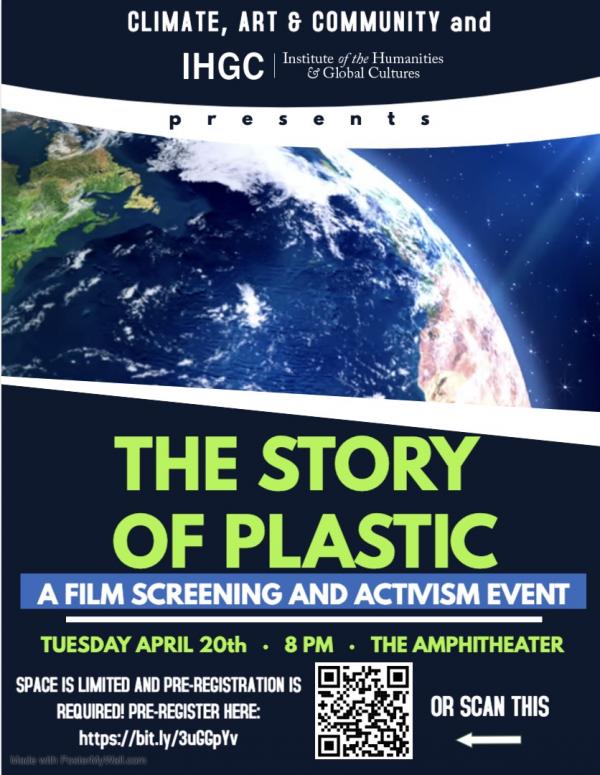Events Archive
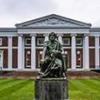
Sarah Nuttall (Witwatersrand), "Futurities" Lecture Series: “Wet Futures: Reading for Rain”
February 17, 2022
Virtual | 12:00- 1:30pmSarah Nuttall (Witwatersrand), "Futurities" Lecture Series: “Wet Futures: Reading for Rain”
February 17, 2022
Virtual | 12:00- 1:30pmSarah Nuttall is Professor of Literary and Cultural Studies and the Director of WISER (Wits Institute for Social and Economic Research) in Johannesburg, South Africa. She is the author of Entanglement: Literary and Cultural Reflections on Postapartheid; editor of Beautiful/Ugly: African and Diaspora Aesthetics, and co-editor of many books, including Negotiating the Past: The Making of Memory in South Africa, Johannesburg – The Elusive Metropolis and Load Shedding: Writing On and Over the Edge of South Africa. Recent essays include ‘Private Lives and Public Cultures in South Africa’, ‘Mandela’s Mortality’ and ‘Secrecy’s Softwares’. She has for many years taught the Fall semester at Yale and then Duke Universities. From January to May 2016, she was an Oppenheimer Fellow at the Du Bois Institute at Harvard University. For three years Sarah has directed WiSER, one of the largest and most established Institutes of humanities scholarship across the global South.

Kasey Jernigan, Workshop on Digital Storytelling & Indigenous Cultures
November 12, 2021
Kasey Jernigan, Workshop on Digital Storytelling & Indigenous Cultures
November 12, 2021

“Coasts in Crisis:” A Digital Exhibit of Art After Hurricanes Virtual Launch
November 12, 2021
“Coasts in Crisis:” A Digital Exhibit of Art After Hurricanes Virtual Launch
November 12, 2021

Book Seminar on South Asian Politics, History, and Culture (Featuring Prathama Banerjee & Rochona Majumdar
November 11, 2021
Book Seminar on South Asian Politics, History, and Culture (Featuring Prathama Banerjee & Rochona Majumdar
November 11, 2021
The seminar will feature talks and a discussion on two recent publications on South Asian political thought, history, and culture by the featured authors.
Prathama Banerjee, Elementary Aspects of the Political: Histories from the Global South
Duke University Press, 2020
https://www.dukeupress.edu/elementary-aspects-of-the-political
In Elementary Aspects of the Political Prathama Banerjee moves beyond postcolonial and decolonial critiques of European political philosophy to rethink modern conceptions of "the political" from the perspective of the global South. Drawing on Indian and Bengali practices and philosophies from the late nineteenth and early twentieth centuries, Banerjee identifies four elements of the political: the self, action, the idea, and the people. She examines selfhood in the light of precolonial Indic traditions of renunciation and realpolitik; action in the constitutive tension between traditional conceptions of karma and modern ideas of labor; the idea of equality as it emerges in the dialectic between spirituality and economics; and people in the friction between the structure of the political party and the atmospherics of fiction and theater. Banerjee reasserts the historical specificity of political thought and challenges modern assumptions about the universality, primacy, and self-evidence of the political
Rochona Majumdar, Art Cinema and India’s Forgotten Futures, Columbia University Press, 2021
http://cup.columbia.edu/book/art-cinema-and-indias-forgotten-futures/9780231201056
In this pioneering book, Rochona Majumdar examines key works of Indian art cinema to demonstrate how film emerged as a mode of doing history and that, in so doing, it anticipated some of the most influential insights of postcolonial thought. Majumdar details how filmmakers as well as a host of film societies and publications sought to foster a new cinematic culture for the new nation, fueled by enthusiasm for a future of progress and development. Good films would help make good citizens: art cinema would not only earn global prestige but also shape discerning individuals capable of exercising aesthetic and political judgment. During the 1960s, however, Satyajit Ray, Mrinal Sen, and Ritwik Ghatak—the leading figures of Indian art cinema—became disillusioned with the belief that film was integral to national development. Instead, Majumdar contends, their works captured the unresolvable contradictions of the postcolonial present, which pointed toward possible, yet unrealized futures.
Prathama Banerjee is Professor at the Centre for the Study of Developing Societies in Delhi, India, and author of Politics of Time: "Primitives" and History-Writing in a Colonial Society (2006) and Elementary Aspects of the Political: Histories from the Global South (2020).
Rochona Majumdar is Associate Professor in the Departments of South Asian Languages and Civilizations, and Cinema and Media Studies at the University of Chicago. She is the author of Marriage and Modernity: Family Values in Colonial Bengal (2009), Writing Postcolonial History (2010), and Art Cinema and India’s Forgotten Futures (2021).
Aswin Punathambekar is Associate Professor in the Department of Media Studies at the University of Virginia. He is the author of From Bombay to Bollywood: The Making of a Global Media Industry (2013), co-author of Media Industry Studies (2020), and co-editor of Global Bollywood (2008), Television at Large in South Asia (2013), and Global Digital Cultures: Perspectives from South Asia (2019).
Samhita Sunya is Assistant Professor in the Department of Middle Eastern and South Asian Languages and Cultures at the University of Virginia. She is the author of Sirens of Modernity: World Cinema Via Bombay (in press,). Her interests span world film history, informal practices of media distribution across South / West Asia and the Indian Ocean, and intersections of audio-visual media and literary forms.

Ed Welch (University of Aberdeen), “Spatial Planning's Time Machine: Spaces of Speed in a Modernized France”
November 5, 2021
Webinar | 10:00 amEd Welch (University of Aberdeen), “Spatial Planning's Time Machine: Spaces of Speed in a Modernized France”
November 5, 2021
Webinar | 10:00 am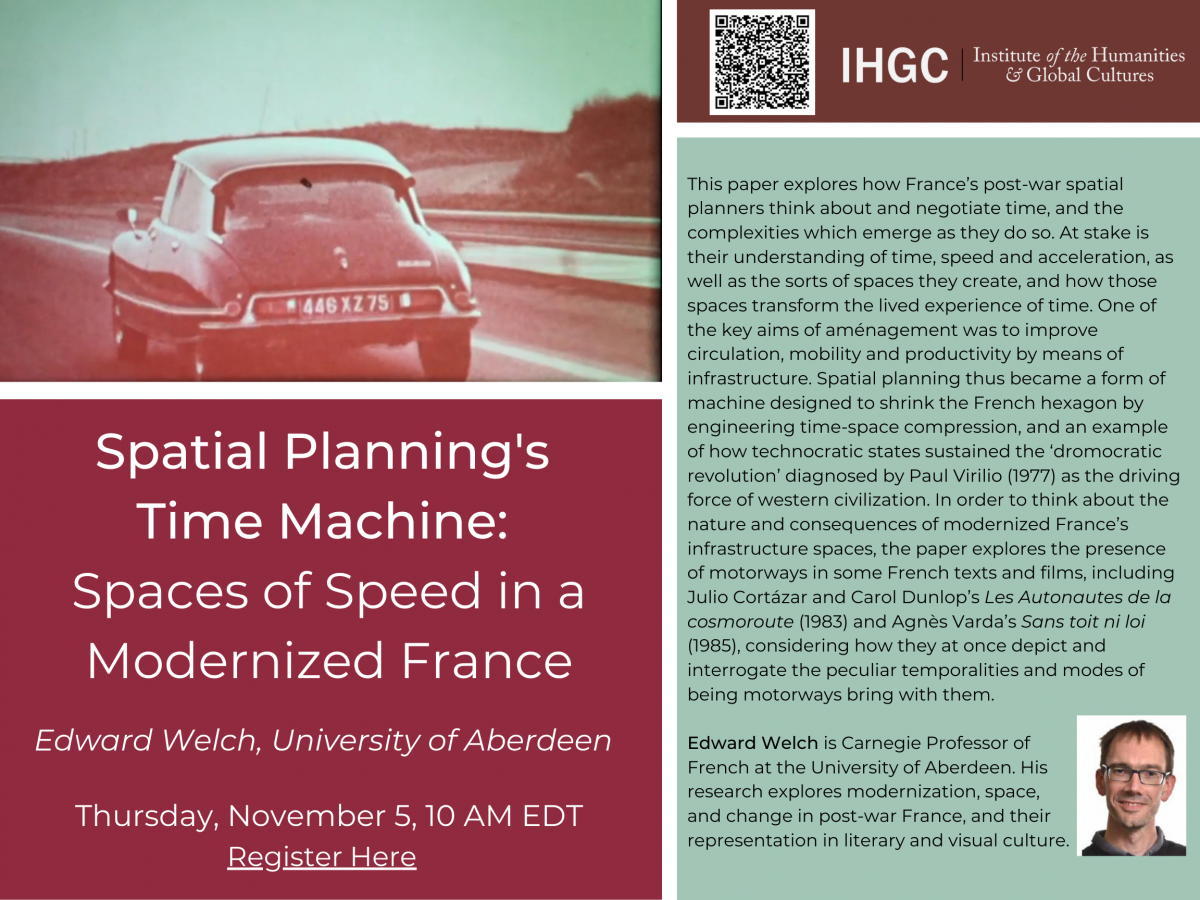
Spatial Planning's Time Machine: Spaces of Speed in a Modernized France
Edward Welch, University of Aberdeen
During the presidency of Charles de Gaulle (1958-1969), France’s look and feel began to be transformed by an extensive programme of spatial planning and modernization (aménagement du territoire). Unfolding over the subsequent decades, aménagement du territoire produced New Towns, holiday resorts, motorways, airports, rapid rail networks and other forms of infrastructure. Yet while modernized space was the most obvious outcome of their work, France’s aménageurs were perhaps even more preoccupied with time. More specifically, they were obsessed with the future. Even, on occasion, they gave the impression that planning was somehow from the future.
Writing in 1965, Oliver Guichard, director of the newly created DATAR spatial planning agency, suggested that ‘l’aménagement ne vit pas dans l’époque présent: il doit toujours la devancer, projeter sur l’avenir’ [spatial planning doesn’t live in the present: it must always be one step ahead, projecting into the future]. Being ahead of its time, planning’s job was to return to the present with insights from the future, and use them to propel the country towards its destiny. Guichard’s comment comes in his book Aménager la France, and is a moment of time-travelling brio in an otherwise relatively sober account of the aims and requirements of French spatial planning. It is also a glimpse of some of the more striking philosophies of time and history lurking beneath the planners’ administrative and technical discourse. In particular, it betrays the influence of the philosopher Gaston Berger, whose notion of la prospective as anticipatory thinking would guide their work during the 1960s and early 1970s.
This paper explores how France’s post-war spatial planners think about and negotiate time, and the complexities which emerge as they do so. At stake is their understanding of time, speed and acceleration, as well as the sorts of spaces they create, and how those spaces transform the lived experience of time. One of the key aims of aménagement was to improve circulation, mobility and productivity by means of infrastructure. Spatial planning thus became a form of machine designed to shrink the French hexagon by engineering time-space compression, and an example of how technocratic states sustained the ‘dromocratic revolution’ diagnosed by Paul Virilio (1977) as the driving force of western civilization. One of its most notable and visible outcomes was the development of France’s system of motorways (autoroutes). In order to think about the nature and consequences of modernized France’s infrastructure spaces, the paper explores the presence of motorways in some French texts and films, including Julio Cortázar and Carol Dunlop’s Les Autonautes de la cosmoroute (1983) and Agnès Varda’s Sans toit ni loi (1985), considering how they at once depict and interrogate the peculiar temporalities and modes of being motorways bring with them.
Biography
Edward Welch is Carnegie Professor of French at the University of Aberdeen. His research explores modernization, space, and change in post-war France, and their representation in literary and visual culture. Publications include France in Flux: Space, Territory and Contemporary Culture, co-edited with Ari Blatt (Liverpool University Press, 2019); Contesting Views: The Visual Economy of France and Algeria, co-authored with Joseph McGonagle (Liverpool University Press, 2013); and François Mauriac: The Making of an Intellectual (Rodopi, 2006). He is currently completing a book on spatial planning and modernization, provisionally entitled Making Space in Post-war France.

Professor China Scherz Manuscript Workshop
October 22, 2021
Wilson Hall 142 |Professor China Scherz Manuscript Workshop
October 22, 2021
Wilson Hall 142 |
Empires in Global Context: A Symposium
October 15, 2021
Wilson Hall 142 | 9:00 am - 6:30 pmEmpires in Global Context: A Symposium
October 15, 2021
Wilson Hall 142 | 9:00 am - 6:30 pm“Empires in Global Context”
A One-Day Workshop, sponsored by the Institute for the Humanities and Global Cultures
Co-organizers: Krishan Kumar (Sociology) and Ted Lendon (History)
Friday, October 15, 2021, 9:00 am to 6:30 pm. Room: Wilson 142
Program
(All participants from UVA except where shown)
9:00-9:15. Introduction to the workshop.
9:15-10:45. The Roman Empire in Global Context. Peter Fibiger Bang (University of Copenhagen, History)
Discussant: Ted Lendon (History)
10:45-11:00 Coffee Break
11:00-12:30. The French Empire in Global Context. Laurent Dubois (History)
Discussant: Marlene Daut (African-American and African Studies)
12:30-1:30 Lunch
1:30-2:45 The Ottoman Empire in Global Context. Dimitri Kastritsis (University of St. Andrews, History). Discussant: Amanda Phillips (Art History)/Joshua White (History)
2:45-4:15 The British Empire in Global Context. Paul Halliday (History)
Discussant: Krishan Kumar (Sociology)
4:15-4:30 Tea Break
4:30-5:45 The Chinese Empire in Global Context. Ellen Zhang (History).
Discussant: Xiaoyuan Liu (History)
5:45-6:30 Concluding Discussion

Coastal Futures Festival Symposium
October 15, 2021
Webinar | 8:00 PMCoastal Futures Festival Symposium
October 15, 2021
Webinar | 8:00 PM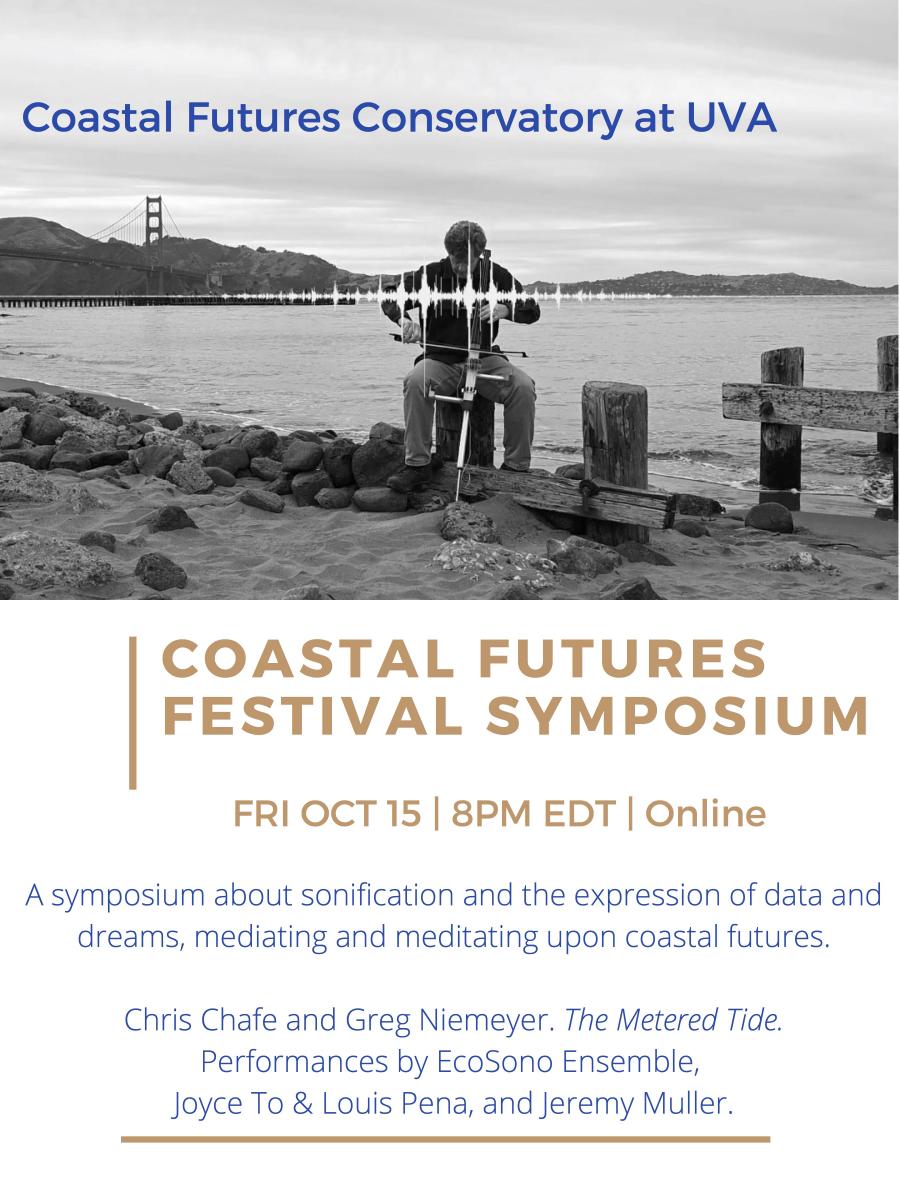
The Coastal Futures Conservatory at the University of Virginia presents a symposium on sonification and expression of data and dreams, mediating and meditating upon coastal futures.
Friday, October 15, 2021, 8pm Eastern US Time (EDT)
The symposium is on line and open to the public.
https://virginia.zoom.us/j/91896921556?pwd=VkRrQzlEcXovdEd2M3ZGVnNURnNSZz09
Meeting ID: 918 9692 1556
Passcode: 152452
The Coastal Futures Conservatory at the University of Virginia presents a symposium featuring Chris Chafe & Greg Niemeyer, Joyce To & Louis Pena, Jeremy Muller, and the EcoSono Ensemble. The symposium will center around issues of coastal futures at play in The Metered Tide, a work by Chris Chafe and Greg Niemeyer using sonification of the California Coast. Chafe and Niemeyer will discuss sonification and their collaborative work on sea level rise, and EcoSono Ensemble will perform a new version of the piece.
In addition, Joyce To and Louis Pena from Australia will perform Chorale, a piece based on coral reef data. We will welcome reflections from a team of scholars who will have just completed a three-day field residency at the VCR.
The symposium will begin and end with movements from Matthew Burtner’s Glisten of Places, a contemplative piece for sonified, geotagged sites and field recordings performed by percussionist, Jeremy Muller.

Sharing and Planning Gathering on Practice-Based/Practice-Led Research in Arts, Culture, and Performance
October 8, 2021
Morven Farm |Sharing and Planning Gathering on Practice-Based/Practice-Led Research in Arts, Culture, and Performance
October 8, 2021
Morven Farm |
Stealing time: photographs and the long inception of colonialism in southern Angola - Webinar led by Patricia Hayes
September 23, 2021
Webinar | 12:00 - 1:30pmStealing time: photographs and the long inception of colonialism in southern Angola - Webinar led by Patricia Hayes
September 23, 2021
Webinar | 12:00 - 1:30pm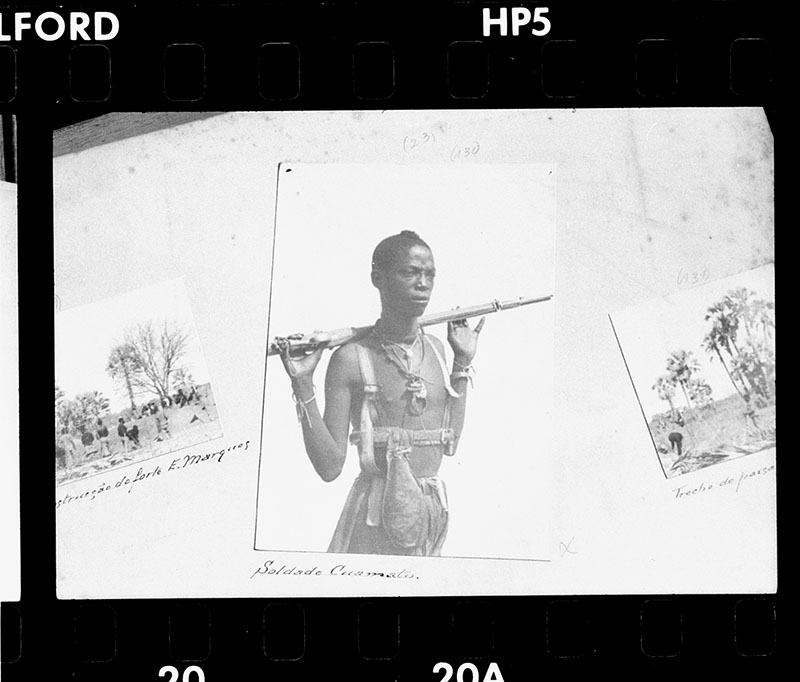
Register Here
‘Stealing Time’ is an attempt to put the teleologies of colonization and progress on hold, to use the space-time compressions of photographs to pause and search for something else. It probes whether new modes of reading photographs might be able to connect us in unexpectedly rich ways with Africa’s more distant past. It explores the interpenetration of ‘sources’ and the durability of things surfacing in photographs that come from more remote histories. Periods of early encounter and the initiation of colonial rule are obviously dense in this regard but tend to be treated as overwhelmingly colonial and going in a certain temporal direction, inevitably foreclosing other eras. The either/or terminology of historical periodization (precolonial/colonial) confines us to a linear conception of time that shuts down other possibilities.
This lecture will concentrate on two separate photographic images from the Cuvelai floodplain located in what is now southern Angola and northern Namibia. In the early twentieth century it was a contested region between Portugal, Germany, several sizeable African kingdoms and later during World War 1, South Africa. The first photograph originates from an album of the Portuguese officer Velloso de Castro who participated in the 1907 military campaign against Cuamato. The second photograph is one of several group portraits emanating from the first official South African tour to Ovamboland in 1915 led by Major Pritchard. Both these images operate as a kind of prism to think about what might have converged in these spaces at that time, and the possible genealogies behind them. Given the ‘micro-levels at which we encounter the past’ through photographs, as well as the foreshortening of history that occurs by not taking ‘the precolonial’ seriously, can such photos help us to think about time differently and expand our spatial sense of Africa’s deeper pasts?
Patricia Hayes is 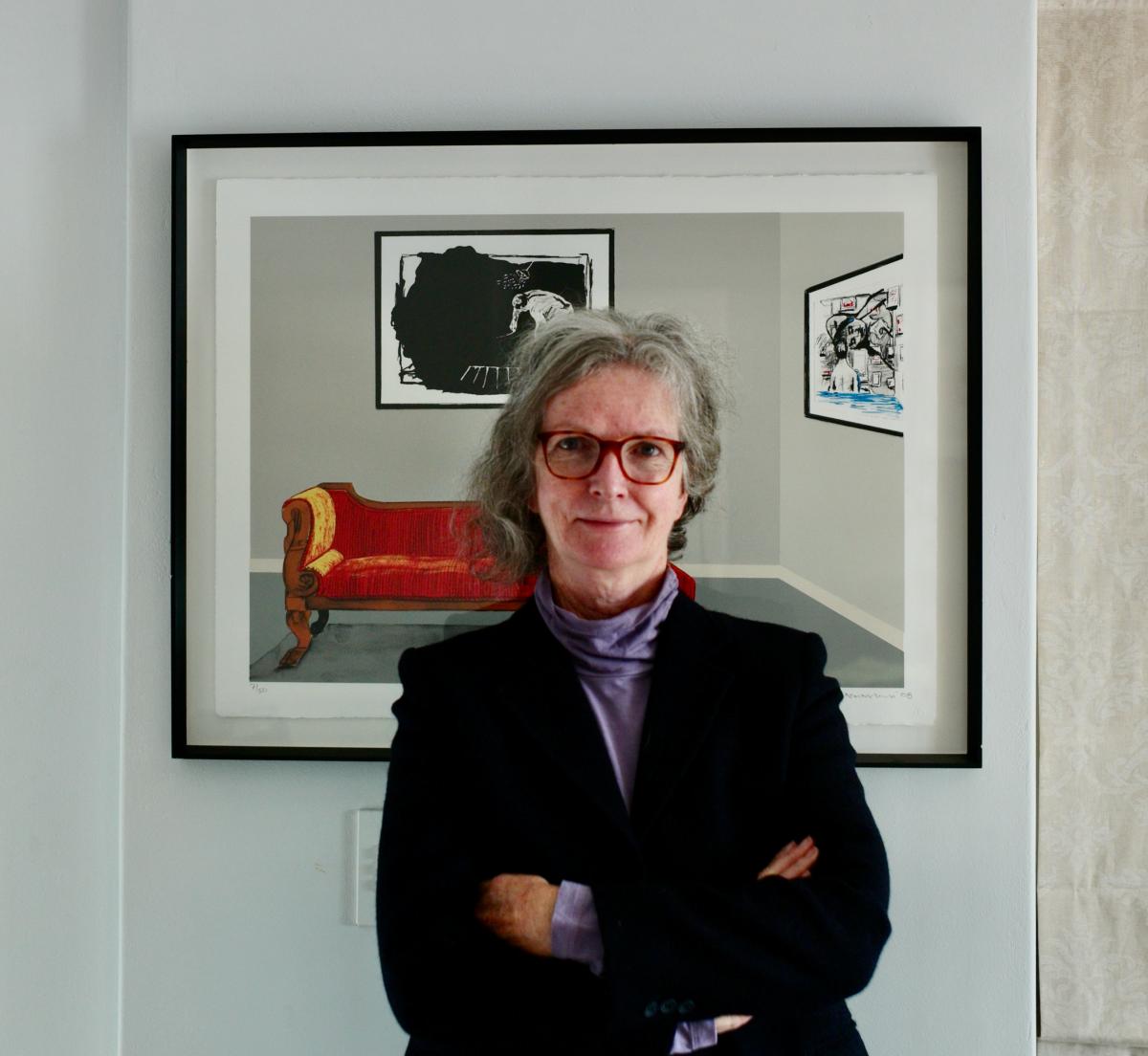 currently the NRF SARChI Chair in Visual History & Theory at the Centre for Humanities Research, University of the Western Cape. Her research background is in African history, and she engages extensively with photographic archives and their methodological challenges to bring together history and aesthetics. She is co-editor of the volume Ambivalent. Photography and Visibility in African History (2019), and the special issue on ‘Other Lives of the Image’ of the journal Kronos (2020).
currently the NRF SARChI Chair in Visual History & Theory at the Centre for Humanities Research, University of the Western Cape. Her research background is in African history, and she engages extensively with photographic archives and their methodological challenges to bring together history and aesthetics. She is co-editor of the volume Ambivalent. Photography and Visibility in African History (2019), and the special issue on ‘Other Lives of the Image’ of the journal Kronos (2020).

“Immunity and Quarantine: The Biopolitics of Space-Making in Pandemics” - Lucerne-UVA-WISER Seminar
September 9, 2021
Webinar | 10:00 am - 12:00 pm“Immunity and Quarantine: The Biopolitics of Space-Making in Pandemics” - Lucerne-UVA-WISER Seminar
September 9, 2021
Webinar | 10:00 am - 12:00 pmImmunity and Quarantine: The Biopolitics of Space-Making in Pandemics
Hosted by the Institute of the Humanities and Global Cultures, University of Virginia &
Wits Institute for Social and Economic Research, University of Witwatersrand
Thursday 9 September, 16.00-18.00 (10.00-12.00 US Eastern Time)
“Immunity”, whether referring to the individual (the official, the diplomat, the patient, the police officer, the doctor) or to the group (civil officers, the police, pharmaceutical companies, the “herd,” or the population) has shuttled among the registers of language that are held responsible for human and social life. Used in law, medicine, politics, religion and philosophy, the idea of immunity underpins that which constitutes the human and its relation to the non-human, disease, impurity, danger, and spatial containment. If natural immunity is the ability to resist infection, legal immunity is the granting of an exemption by a higher authority. In the case of ecclesiastical immunity, immunity is an exception from secular or civil duties. The afterlife of this ecclesiastical model can be found, for example, in the notion of qualified immunity given to police officers in the US who have murdered African Americans. Immunity as a category has gone hand in hand with the idea of quarantine: the enclosure of peoples and places to protect the larger population from contamination of various kinds - epidemiological, ideological, cultural, psychic, and moral. Together, immunity and quarantine have been mutually constitutive in the spheres they have shaped and curtailed. In this seminar, we will explore their interplay both in the context of the differential spatial logics of the Covid-19 pandemic and the cultural and political ramifications of the AIDS epidemic. Theories on vaccines and immunity, biopolitical thought, critical race theory, as well as cultural products such as literary works and art projects will feature in the presentations.
Professor Sarah Nuttall, Director, WISER, University of the Witwatersrand, will introduce the topic and moderate the seminar.
Professor Ranjana Khanna, Director, Franklin Humanities Institute, Duke University, will offer an intellectual history of immunity ranging from ancient legal regimes like the Roman to the rise of queer theory during the AIDS era. She will also draw on critical race theory (a product of legal scholarship) to reflect on the limits of qualified immunity that offers protection to law enforcement authorities in dealing with racial violence.
Professor Debjani Ganguly, Director, Institute of the Humanities and Global Cultures, University of Virginia will explore the interplay of immunity and autoimmunity in a biopolitical regime marked by complex systems, the emergence of risk discourse, and theories of probability. Her talk will engage with the works of Michel Foucault, Roberto Esposito, and Ulrich Beck, and offer insights into speculative fictional modes on pandemics.

"The Cambridge History of World Literature" Launch Event w/ Debjani Ganguly, Francesca Orsini, Jahan Ramazani, and B. Venkat Mani
May 27, 2021
Webinar | 11:00 am - 12:00 pm"The Cambridge History of World Literature" Launch Event w/ Debjani Ganguly, Francesca Orsini, Jahan Ramazani, and B. Venkat Mani
May 27, 2021
Webinar | 11:00 am - 12:00 pm
On May 27th @ 4-5 pm BST and 11-12 pm EST, Please join us for a virtual launch event for the forthcoming The Cambridge History of World Literature, edited by Debjani Ganguly. Debjani Ganguly will be on a panel alongside Francesca Orsini, Jahan Ramazani, and B. Venkat Mani.

Debjani Ganguly is Professor of English and Director of the Institute of the Humanities and Global Cultures at the University of Virginia. She works in the fields of world literature, postcolonial studies and South Asian studies. Her research interests include novel studies, theories of world literature, global Anglophone literatures, technologies of war and violence, literature and human rights, planetary humanities, caste and dalit studies, and Indian Ocean literary worlds.
Francesca Orsini is a literary historian at the University of London's School of Oriental and African Studies working primarily with Hindi and Urdu materials and interested in exploring how multilingualism worked and continues to work within the literary cultures of South Asia.
Jahan Ramazani is University Professor and Edgar F. Shannon Professor of English at the University of Virginia. He is the author of a number of books of criticism on poetry, including Poetry in a Global Age (2020) and Poetry and Its Others: News, Prayer, Song, and the Dialogue of Genres (2013).
B. Venkat Mani is Professor of German at the University of Wisconsin-Madison, where he is also affiliated with the Center for the History of Print and Digital Culture and the Institute for Regional and International Studies.
Register here

Rethinking World Literature: China as Method - "Recovering First Patients: De-anglophonizing the Pandemic Archive on SARS”
May 14, 2021
Webinar | 12:00 pm - 1:30 pmRethinking World Literature: China as Method - "Recovering First Patients: De-anglophonizing the Pandemic Archive on SARS”
May 14, 2021
Webinar | 12:00 pm - 1:30 pmBelinda Kong, Associate Professor, Bowdoin College
"Recovering First Patients: De-anglophonizing the Pandemic Archive on SARS”

Trans-National Ties: Formation Between the Episcopal Mission of Hankow and the Chinese Bible Church of Greater Boston (w/ Natasha Heller & Emily Yen)
May 4, 2021
Webinar | 12:00 pmTrans-National Ties: Formation Between the Episcopal Mission of Hankow and the Chinese Bible Church of Greater Boston (w/ Natasha Heller & Emily Yen)
May 4, 2021
Webinar | 12:00 pmWhile there is extensive scholarship on protestant missions in China prior to 1950 and the emergence of Chinese American protestant churches in the United States during the second half of the 20th Century, there is a limited understanding of the mechanisms that allowed the former to shape the growth of the latter. There is little empirical research on the relationships between the recalled missionaries in China and the Chinese student migrants fleeing to the United States during the McCarthy Era. This case study traces how the social ties formed between a missionary and congregants at the Episcopal Mission of Hankow shaped the emergence of the Chinese Bible Church of Greater Boston. These pre-migration ties significantly shaped the Chinese Christian community in Boston and complicate our understanding of the mechanisms facilitating Boston’s Quiet Revival and Chinese American church planting. More broadly, this case study provides insight into how recalled missionaries can shape immigrant communities.
Register here
Natasha Heller studies Chinese Buddhism in the context of cultural and intellectual history. Her research includes both the pre-modern period (10th through 14th c.) and the contemporary era. Heller's study of an eminent monk of the Yuan dynasty, Illusory Abiding: The Cultural Construction of the Chan Monk Zhongfeng Mingben, was published by Harvard University Asia Center in 2014. This monograph examines Mingben’s use of poetry, calligraphy, and gong’an commentary in the context of his distinctive Chan (Zen) teachings. Heller’s current book project concerns picture books published by Buddhist organizations in Taiwan, and how such children’s fiction not only teaches young people about the Buddhist tradition, but also addresses how to relate to clergy, family members, and society. She has published in journals such as History of Religions, the Harvard Journal of Asiatic Studies, and Material Religion.
Emily H. A. Yen is a Visiting Faculty Scholar at the Institute of the Humanities and Global Cultures at the University of Virginia. She earned a doctorate in Sociology at UCLA and was Kelter Postdoctoral Fellow in Urban Studies at Trinity College.

East Asian Cultural Responses to the Covid-19 Pandemic
April 26, 2021
Webinar | 7:00 pmEast Asian Cultural Responses to the Covid-19 Pandemic
April 26, 2021
Webinar | 7:00 pmWhile policy and strategy decisions have dominated mainstream media coverage of other nations’ handling of the Covid-19 pandemic, it is also important to consider how at the level of everyday life, societies and individuals have been experiencing the upheavals caused by the pandemic. This panel thus focuses on East Asian cultural reactions to this worldwide crisis.
Jaeho Kang (Seoul National University) will describe how South Korean responses to the pandemic have been shaped by a confluence of technological and traditional cultural factors, and are interpreted along these rubrics. Chenshu Zhou (University of Pennsylvania) will be examining online video representations of Wuhan under lockdown that make use of drone footage. Anri Yasuda (University of Virginia) will analyze how works of Japanese literature written during the pandemic underscore a pervasive 'crisis ordinary' mentality that precedes Covid-19. After the presentations, there will be time for dialogue and exchanges about the shared themes, as well as the marked differences, amongst the contemporary East Asian socio-cultural contexts under discussion.
Registration link forthcoming

Teaching the 'Long' 18th Century
April 23, 2021
Webinar | 9:00 am - 11:00 amTeaching the 'Long' 18th Century
April 23, 2021
Webinar | 9:00 am - 11:00 am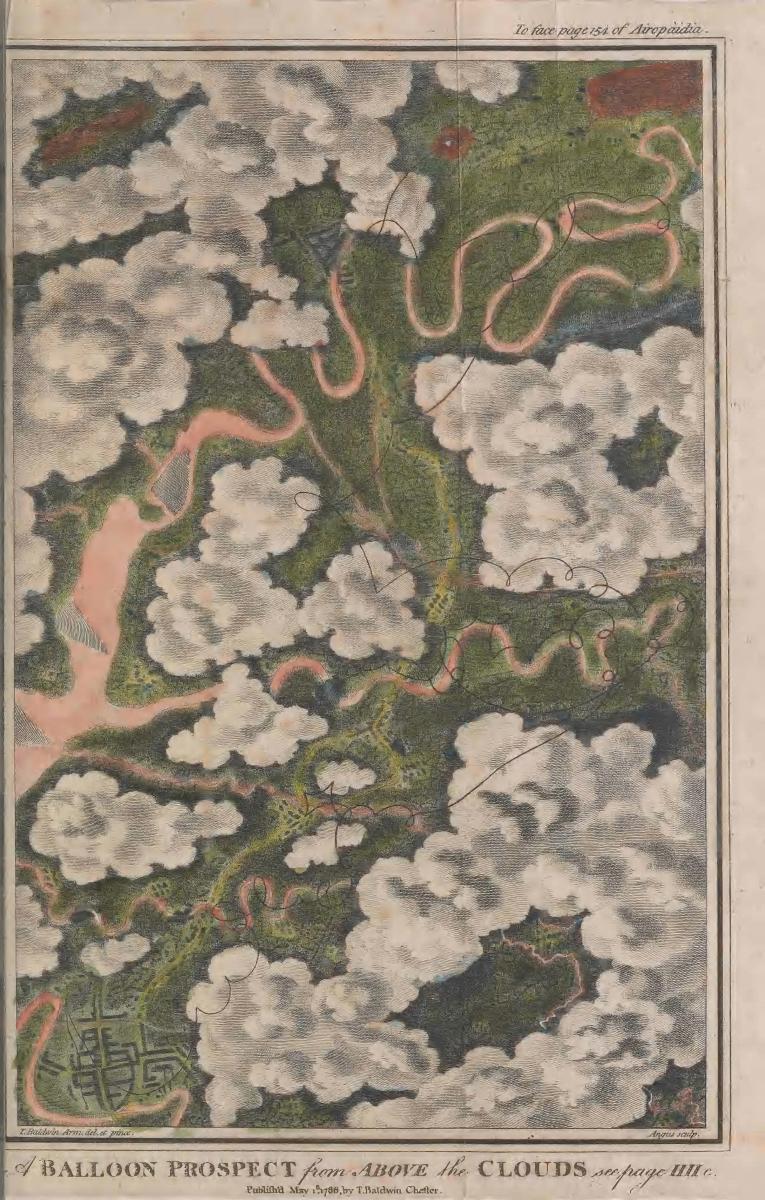
After Thomas Baldwin, A Balloon-Prospect from above the Clouds,
plate from Thomas Baldwin, Airopaidia (London; Chester: Printed for the author, 1786), 154.
Friday, April 23, 2021
9-11 am EDT
"Teaching the ‘Long’ 18th Century"
Organized by Sarah Betzer, University of Virginia,
and Dipti Khera, Art History and Institute of Fine Arts, New York University
Roundtable featuring:
Anna Arabindan-Kesson, Princeton University
Nebahat Avcıoğlu, Hunter College, City University of New York
Emma Barker, The Open University, London
Ananda Cohen-Aponte, Cornell University
Prita Meier, Art History and Institute of Fine Arts, New York University
Nancy Um, Binghamton University, State University of New York
Stephen Whiteman, The Courtauld Institute of Art, London
This roundtable brings together scholars from a broad array of geographical foci and institutional perspectives who have been at the forefront of efforts to rethink approaches to thinking, researching, and, crucially, teaching the art and material culture of an interconnected “long” eighteenth century. Convened in conjunction with a session at the 2021 College Art Association conference, the roundtable will appear in distilled form in a dedicated issue of Journal18, forthcoming in Fall 2021. Two key aims animate the roundtable and its afterlife in Journal18: 1) to reflect upon teaching the “long" eighteenth century, particularly in light of renewed debates on the reparation of objects, revision of histories, and inclusion of colonized and enslaved voices in museums, plantation sites, and public squares; and 2) to compile a list of resources and open-access supporting materials that are pragmatically useful for colleagues engaged in teaching the “long” and “broad” eighteenth century.

Humanities Week 2021: Normalcy in Arts and Theatre - Broadway Talks Back with Alice Ripley
April 23, 2021
Webinar | 3:00 pm - 4:00 pmHumanities Week 2021: Normalcy in Arts and Theatre - Broadway Talks Back with Alice Ripley
April 23, 2021
Webinar | 3:00 pm - 4:00 pmJoin Tony award winning actress Alice Ripley as she discusses her experience in the hit Broadway show Next to Normal and normalcy in the theatre.
Zoom link TBD

Humanities Week 2021: UVA Sustainability
April 22, 2021
Humanities Week 2021: UVA Sustainability
April 22, 2021
Join Humanities Week as we partner with UVA Sustainability on Earth Day to explore normalcy in the environment.
Watershed Clean-Up
1-3PM // Meadow Creek and Pollock's Branch
Join The Nature Conservancy and Charlottesville Parks for an Earth Day Celebration! You will be helping to clean up the watershed around Meadow Creek and Pollock's Branch to prevent plastic pollution from reaching the Chesapeake Bay. Volunteers must read and sign our COVID field guidelines and health screening questions. Guidelines include having a mask readily accessible if working less than 6' apart, bringing hand sanitizer and confirming you have health insurance. Email caitlin.embly@tnc.org for more information.
Leave No Trace Awareness Workshop
6-7PM // Zoom
Learn the 7 principles of Leave No Trace during this Awareness Workshop! Participants will learn how to hike, camp, and explore outside in a way that leaves a minimal impact. We will also touch on the upcoming City Nature Challenge and how to participate while leaving no trace.
Zoom registration link
SUN SiNG in Place Earth Day Concert
7-8PM // Livestreamed on Vimeo, Youtube, and Facebook
Join ARTivism Virginia and the SUN SiNG Collective for #EarthDay2021 at 7:00PM Eastern for one hour of music, spoken word, and action opportunities as we stay connected in resistance to new fossil fuel infrastructure, united in our fights for environmental justice, and together in solidarity for a livable future! Streaming live on:
Vimeo: https://www.vimeo.com/artivismvirginia
YouTube: https://www.youtube.com/c/artivismvirginia
And Facebook: https://www.facebook.com/artivismvirginia

The Subjectivity of the Translator
April 21, 2021
Webinar | 7:00 pmThe Subjectivity of the Translator
April 21, 2021
Webinar | 7:00 pmJeremy Tiang discusses the process of translating the late Yeng Pway Ngon's Unrest, and what it means to be a Singaporean Chinese translator working within his own community and culture. What happens to the metaphor of translation as a 'bridge' when both ends of the bridge are located in the same place? Can the translator truly be neutral, or should we pay more attention to who is doing the translating?
Jeremy Tiang is a novelist, playwright and translator from Chinese. His translations include novels by Yeng Pway Ngon, Su Wei-Chen, Yan Ge, Zhang Yueran, Lo Yi-Chin, Chan Ho-Kei and Li Er. His plays include Salesman之死, A Dream of Red Pavilions, and translations of scripts by Chen Si’an, Wei Yu-Chia, Quah Sy Ren and others. His novel State of Emergency won the Singapore Literature Prize in 2018. He lives in Flushing, Queens, and is a member of the translation collective Cedilla & Co.

Humanities Week 2021: PechaKucha Presentation Night
April 21, 2021
Webinar | 7:30 pm - 8:30 pmHumanities Week 2021: PechaKucha Presentation Night
April 21, 2021
Webinar | 7:30 pm - 8:30 pmJoin Humanities Week in our inaugural PechaKucha night! PechaKucha (Japanese for “chit chat”) is the world’s fastest-growing storytelling platform, used by millions around the globe. Watch a selection of PechaKucha presentations by UVA students for an evening of engaging and informational fun.
Prizes available for submissions! Submit your own PechaKucha video below for a chance to win!

Good Neighbors? Charlottesville & UVA: Webinar feat. Davarian Baldwin, Ang Conn, & Laura Goldblatt
April 20, 2021
Webinar | 4:00 pmGood Neighbors? Charlottesville & UVA: Webinar feat. Davarian Baldwin, Ang Conn, & Laura Goldblatt
April 20, 2021
Webinar | 4:00 pm
Next: Good Neighbors? Charlottesville & UVA
|

Music and Mimesis: A Roundtable Discussion
April 20, 2021
Webinar | 9:30 am - 11:30 amMusic and Mimesis: A Roundtable Discussion
April 20, 2021
Webinar | 9:30 am - 11:30 amMusic and Mimesis: A Roundtable Discussion
Register here
Imitation, or mimesis, may be the glue that binds culture, but we have yet to take the full measure of its forms, processes, and effects. This two-hour session is devoted to exploring mimesis within the realm of music—a line of inquiry that is still in its early stages. How does mimesis manifest itself within music? What makes musical mimesis important to study? How does it relate to other instances of mimesis in culture? We will broach these and other questions in a roundtable discussion moderated by Michael Puri (UVa), and featuring Arnie Cox (Oberlin College), Roger Mathew Grant (Wesleyan University), and Daniel Villegas Vélez (KU Leuven).

Humanities Week 2021: Cooking Class Livestream
April 20, 2021
Webinar | 6:00 pm - 7:30 pmHumanities Week 2021: Cooking Class Livestream
April 20, 2021
Webinar | 6:00 pm - 7:30 pmJoin Teen Chopped Champion and UVA fourth-year Veronica Seguin as she prepares a dish in the International Center kitchen! With people at home now more than ever, learning and improving our cooking skills has become the new normal. Buy the ingredients in advance and follow along to take care of dinner for the night!

Humanities Week 2021: The Story of Plastic Film Screening
April 20, 2021
UVA Ampitheater | 8:00 pmHumanities Week 2021: The Story of Plastic Film Screening
April 20, 2021
UVA Ampitheater | 8:00 pm
Humanities Week 2021: Normalcy in Politics Lecture and Q&A with Larry Sabato
April 19, 2021
Webinar | 3:30 pm - 4:30 pmHumanities Week 2021: Normalcy in Politics Lecture and Q&A with Larry Sabato
April 19, 2021
Webinar | 3:30 pm - 4:30 pm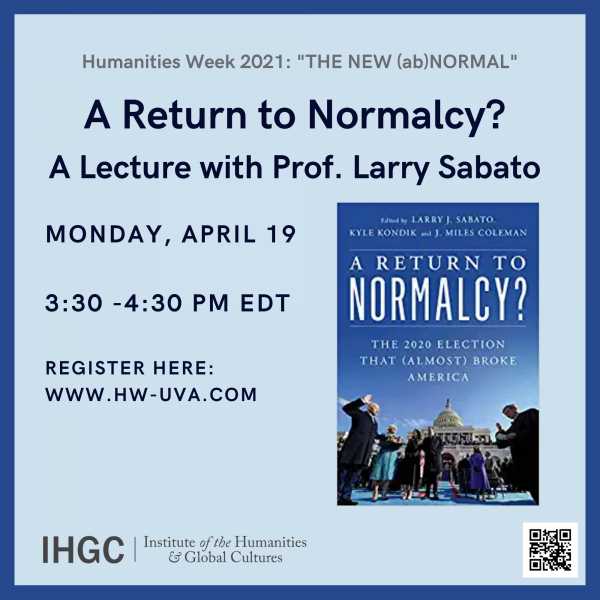
Tune in to catch a riveting, timely talk about (ab)normalcy in politics with Center for Politics Director Larry Sabato! The short talk will be followed by a brief Q&A where students will be able to submit questions for Prof. Sabato to answer, moderated by Humanities Week volunteers in the Batten School. Also be sure to check out a new book on the subject, A Return to Normalcy?, edited by Larry Sabato.

